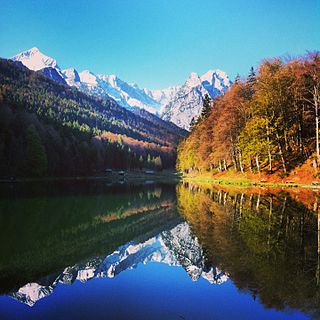Two man bobsleigh
| Pos | Team | Time |
|---|---|---|
| Gold | ||
| Silver | ||
| Bronze |
Eugenio Monti's five straight championship victories ended when he did not qualify for the team leading to the event at Garmisch-Partenkirchen.
| 1962 World Championships | |
|---|---|
| Location | Garmisch-Partenkirchen, West Germany |
The FIBT World Championships 1962 took place in Garmisch-Partenkirchen, West Germany for the fifth time after hosting the event previously in 1934 (Four-man), 1938 (Four-man), 1953, and 1958.
| Pos | Team | Time |
|---|---|---|
| Gold | ||
| Silver | ||
| Bronze |
Eugenio Monti's five straight championship victories ended when he did not qualify for the team leading to the event at Garmisch-Partenkirchen.
| Pos | Team | Time |
|---|---|---|
| Gold | ||
| Silver | ||
| Bronze |
| Rank | Nation | Gold | Silver | Bronze | Total |
|---|---|---|---|---|---|
| 1 | 1 | 2 | 0 | 3 | |
| 2 | 1 | 0 | 1 | 2 | |
| 3 | 0 | 0 | 1 | 1 | |
| Totals (3 entries) | 2 | 2 | 2 | 6 | |
The FIBT World Championships 1934 took place in Engelberg, Switzerland (Two-man) and in Garmisch-Partenkirchen, Germany (Four-man).
The FIBT World Championships 1938 took place in St. Moritz, Switzerland (Two-man) and Garmisch-Partenkirchen, Germany (Four-man). St. Moritz hosted the two-man event for the first time after hosting the four-man event previously in 1931, 1935, and 1937 while Garmisch-Partenkirchen hosted the four-man event previously in 1934.
The FIBT World Championships 1953 took place in Garmisch-Partenkirchen, West Germany for the third time after previously hosting the four-man event of the championships in 1934 and 1938. The event was marred by the death of Switzerland's Felix Endrich who won the two-man event gold medal only to die in competition during the four-man event a week later.
The FIBT World Championships 1958 took place in Garmisch-Partenkirchen, West Germany for the fourth time. The West German city had hosted the event previously in 1934 (Four-man), 1938 (Four-man), and 1953.
Heinrich "Heini" Isser was an Austrian bobsledder-luger who competed during the 1950s and 1960s. He was born in Matrei in Osttirol.

Joseph Beerli was a Swiss bobsledder who competed from the mid-1930s to the late 1940s. At the 1936 Winter Olympics in Garmisch-Partenkirchen, he won a gold medal in the four-man and a silver in the two-man events.

Arnold "Noldi" Gartmann was a Swiss bobsledder who competed in the late 1930s. He won a gold medal in the four-man event at the 1936 Winter Olympics in Garmisch-Partenkirchen.

Wolfgang Hoppe is a former East German decathlete, bob pilot and 36-time international medal winner who competed from the early 1980s to the late 1990s. Competing in four Winter Olympics, he won six medals with two golds, three silvers, and one bronze (1994).
Felix Endrich was a Swiss bobsledder who competed in the late 1940s and early 1950s. Competing in two Winter Olympics, he won the gold medal along with brakeman Fritz Waller in the two-man event at the 1948 Winter Olympics in St. Moritz.
Josef "Pepi" Bader was a West German bobsledder who competed in the late 1960s and early 1970s. He was born in Grainau.
Fritz Schwarz was a German bobsledder who competed in the 1930s. He won two medals at the 1934 FIBT World Championships with a gold in the four-man and a silver in the two-man event.
Hermann von Valta was a German bobsledder who competed in the 1930s. He won two gold medals in the four-man event at the FIBT World Championships. Valta also competed at the 1936 Winter Olympics in Garmisch-Partenkirchen, finishing fifth in the two-man event and seventh in the four-man event.
Emil Angelescu was a Romanian bobsledder who competed in the 1930s. He won a silver medal in the four-man event at the 1934 FIBT World Championships in Garmisch-Partenkirchen.
Teodor Popescu was a Romanian bobsledder who competed in the 1930s. He won a silver medal in the four-man event at the 1934 FIBT World Championships in Garmisch-Partenkirchen.
Dumitru Gheorghiu was a Romanian bobsledder who competed in the 1930s. He won a silver medal in the four-man event at the 1934 FIBT World Championships in Garmisch-Partenkirchen, Germany.
Jacques Bridou was a French bobsledder who competed in the 1930s. He won a bronze medal in the four-man event at the 1934 FIBT World Championships in Garmisch-Partenkirchen.
Walter Haller was a West German bobsledder who competed in the late 1950s. He won a gold medal in the four-man event at the 1958 FIBT World Championships in Garmisch-Partenkirchen.
Anton "Toni" Pensperger was a West German bobsledder who competed during the 1960s. He was posthumously awarded a gold medal in the four-man event after he was killed during the event at the 1966 FIBT World Championships in Cortina d'Ampezzo. His surviving teammates Ludwig Siebert, Helmut Werzer, and Roland Ebert received their golds as well.

Riessersee is a German lake located in southwest Garmisch-Partenkirchen. The lake itself hosted the speed skating events and 10 of the 37 ice hockey games for the 1936 Winter Olympics. Adjacent to the lake, the bobsleigh events took place.
For the 1936 Winter Olympics in Garmisch-Partenkirchen, Germany, a total of six sports venues were used. Alpine skiing events took place for the first time and were held in three different locations. Riessersee held the speed skating and some of the ice hockey matches while the bobsleigh events took place south of the lake. The ski jump and its neighboring stadium played host to the cross-country skiing, Nordic combined, and ski jumping events. Even though figure skating and some of the ice hockey matches took place outdoors at the ice stadium, the ice itself was artificially refrigerated to prevent ice thawing.